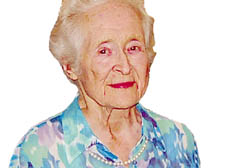|
|
 |
| |

Dame Mary Douglas |
Pioneer who opened anthropology to all
DAME Mary Douglas, who has died aged 86, became known as one of the leading anthropologists of the 20th century, establishing a reputation for writing about complicated subjects in clear and straightforward language.
Mary, who lived in Holly Lodge, Highgate, was born in Italy. While en route from a stint working for the Colonial Office in India, her parents, Gilbert Tew and Phyllis Twomey, had stopped off in San Remo.
Mary’s mother died when she was aged 12. She was sent as a boarder to Sacred Heart School in Roehampton, which was run by nuns. Her Catholicism influenced her work and she would frequently visit St Joseph’s in Dartmouth Park Hill before walking home through Waterlow Park.
She studied at Oxford and did field work in the early 1950s in the Democratic Republic of Congo. She wrote on the culture of the tribal group, the Lele of the Kasai, explaining their complex family arrangements in simple terms.
In 1951 she started working at University College London (UCL) and also got married. Settling in London, she was the driving force behind establishing UCL’s anthropology department.
Mary’s faith played a role in the areas of research she pursued: later in life she studied the Old Testament, which led on from her theories of how and why humans use complicated systems of classification.
She wondered why pork was seen as unclean and how humans put animals into different groups and then further sub-groups. In her 1967 book, Purity and Danger, she used diverse sources to discuss concepts of pollution and impurities, religion and holiness. The book also established a tool dubbed the ‘group’ and ‘grid’ system: the group idea referred to how humans consider themselves as sitting within a social clan, while the grid idea shows how strong the rules within the group are and in turn how they bind the group.
Mary’s system seemed to underline her own strongly held beliefs: that a society with strong family ideals and a hierarchical system would score strongly, while one with an individualist ethos would not perform well.
Anthropologist John Peel told the New Journal that Mary’s work had been hugely influential. He said: “Mary’s book argued that human society has systems of classification. Things that do not fit people feel uncomfortable about. They are seen as dirty or threatening, and they give rise to feelings of anxiety and things not being quite right.
“Anthropologists go to remote places and study specific things – from these studies they draw conclusions about human thought in general. Not many anthropologists succeed in doing that. She broke through and was able to reach a wide public.”
Having studied African cultures, Mary switched her focus to western culture. She wrote widely on food and received a research grant to consider the classification of food.
Mary wrote on why people combine certain foods in certain ways, and why meals are arranged the way they are. She was criticised for this – a question was asked in Parliament about the funding for such seemingly useless pieces of social science, her work deemed trivial and dubbed “the sociology of the biscuit”.
But time has proved her critics wrong. Today her work has great resonance, with growing interest in diet and obesity and why cultures eat food in particular ways being apparent.
Colleagues at UCL remember her as a genuine intellectual, some one who spent her whole life considering why humans behave the way they do.
She spent time in later years editing and preparing for publication her father’s writings on trout fishing, which led her inquiring mind to wonder why the trout was always referred to in diverse cultures around the world as a female. Another paper beckoned.
She was made a DBE in the 2007 New Year’s Honours list and in April spoke to a packed public lecture at UCL, about “Seeing in black and white: the origins of sectarian violence and the problems of small groups”.
|
| |
|
 |
|
 |
|

